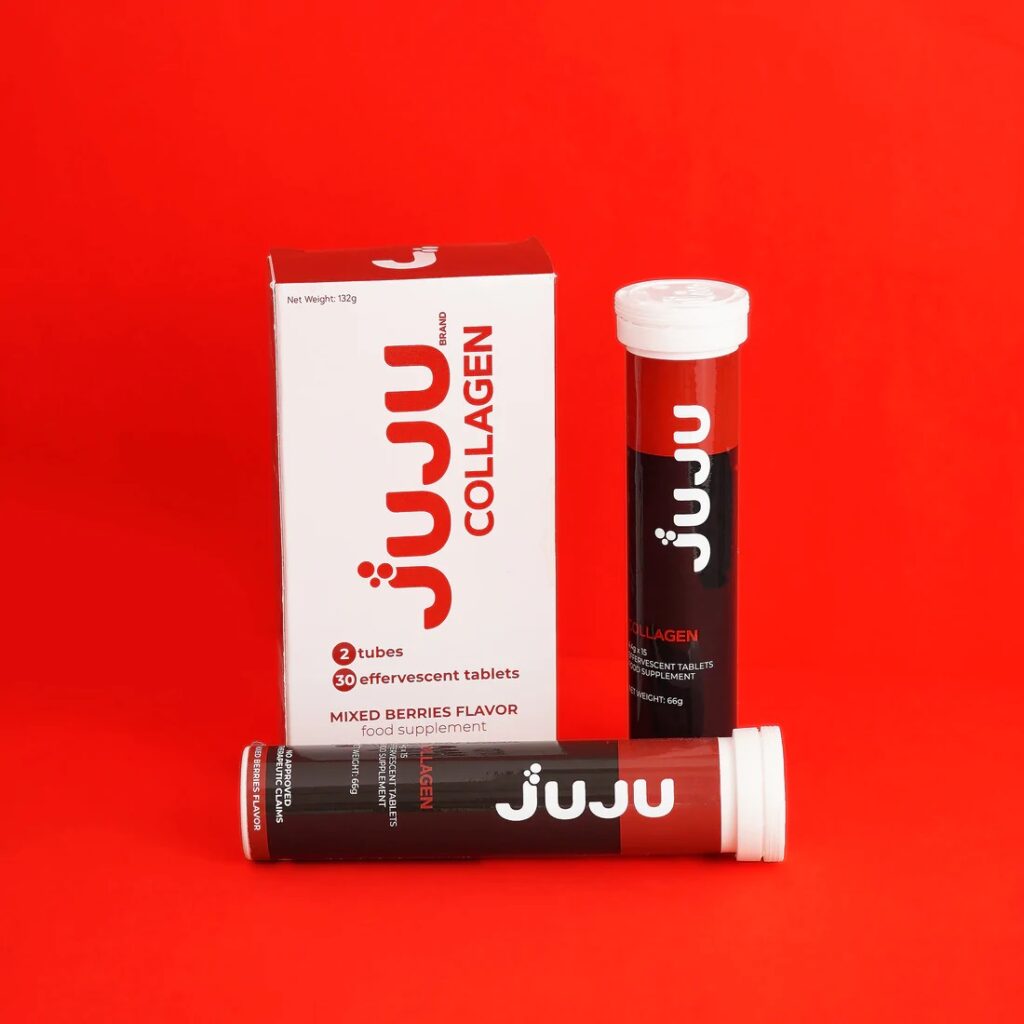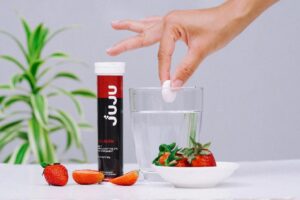We’re sure you’ve heard of collagen as a way to get that perfect skin. But you’re still not clear what collagen is. You still have questions, such as Is collagen a protein? What exactly is it, and how does it affect your body?
If you’re seeking collagen information, you should probably keep reading. Understanding the protein thoroughly can help us arrive at some important questions and, eventually, answers.
/ IN THIS ARticle
What Is Protein?
Protein can be present in muscle, bone, skin, hair, and almost every other body part or tissue. It is the building block of enzymes, which power many chemical reactions, as well as hemoglobin, which transports oxygen in your blood. At least 10,000 different structural proteins contribute to your identity and keep you that way.
What Is Collagen?
Collagen is more than just the hype. Collagen is the most abundant protein in the animal body, and it may be found anywhere from the bones to the skin. In fact, collagen accounts for over one-third of muscle mass and is an important component of joint cartilage, tendons, and ligaments. Despite its presence, it is only acted on by one enzyme: collagenase.
Collagen is a protein found in the connective tissues of the body. It’s not a single molecule, but rather a long-chain helix of amino acids linked together by peptide bonds. Collagen accounts for roughly 30% of the human body’s weight. In fact, the human body has ten times the amount of collagen found in bone.
Functions of Collagen in the Body
Because collagen is found in so many important areas of our bodies, it is not only useful but also necessary for staying healthy.
Skin Benefits
One of the most common applications for collagen supplements is to improve skin health. Collagen supplements, according to research, may improve certain aspects of skin health and appearance.
A lot of studies have found that consuming collagen supplements can give you healthy skin, moisture and suppleness while also reducing wrinkle appearance.
Thicker Hair
While men are more likely to grow bald, many women experience hair loss or thinning as they age. In one study, a group of women with thinning hair reported significant gains in hair quantity, scalp coverage, and thickness when taking daily collagen supplements.
Healthier Nails
Some people’s nails break more easily and grow slower than others. After only 4 weeks of daily collagen intake, one study found that women had faster nail development and fewer damaged or chipped nails.
Reduced Osteoarthritis Pain
Collagen supplements may work as a minor pain reliever and enhance joint function in persons with knee osteoarthritis. It may take 3-5 months of daily treatment before you notice these benefits.
Improved Heart Health
Collagen aids in the preservation of the structure of your arteries and blood vessels. When you don’t have enough collagen, your arteries can become weak. Atherosclerosis, which can lead to a heart attack or stroke, is exacerbated by fragile blood vessels. A tiny trial on healthy persons discovered that collagen powder helped keep arteries healthy and reduced the chance of atherosclerosis. It can also improve gut health, weight management and improve immune system.
Collagen and Protein Deficiency
Natural collagen production decreases down after the age of 25. But what happens when your body’s natural collagen supplies are reduced? Collagen deficit is the cause of ageing skin elasticity, wrinkles, joint pain, and taking longer to heal from injury or workout. All of these factors influence how well your body reconstructs and applies collagen to places in need. To compensate for the natural reduction, you can consume enough collagen and collagen-boosting nutrients and avoid those that harm production of collagen.
Common symptoms of collagen deficiency:
- Wrinkles
- Blood Pressure
- Joint Pain
- Aching Muscles
- Cellulite
- Loss of Mobility
- Dull or Thin hair
- Dental Issues
- Facial Hallowing
- Leaky Gut
- Wounds heal slower
Collagen Supplements
- Pills or Tablets
Collagen can also be taken in the form of pills or tablets. These are dietary supplements that are often taken regularly. People who do not want to deal with the hassle of mixing collagen into something prefer collagen capsules. They can finish the tablets fast with a glass of water. Collagen pills are nothing more than capsule collagen powder with no additional benefits. Additionally, when combined with vitamin C, it can help in collagen synthesis and increase collagen.
Another thing to consider is the dosage. Because capsules aren’t all that big, you may need to take several to get the same amount as scooping in some collagen powder. Aside from those little limitations, collagen supplements are an excellent alternative for achieving your supplemental goals.
If you’re looking for collagen supplements, consider Juju Collagen with Vitamin C Effervescent Tablets. It is a berry-flavored effervescent tablet that contains Collagen, Vitamin C, Vitamin E, Elastin, and other nutrients.
- Collagen Shots
Liquid collagen is one of the most common types of collagen. Depending on the product, it is essentially dissolved collagen in various combinations. Just keep an eye out for extra additives and flavorings. These are commonly made using high-calorie syrups and juice concentrates.
- Powder
Collagen powder can be added to foods and beverages. This can be taken on a daily basis, either in water or combined with your favorite morning beverage.
- Serums and Creams
Collagen is not just taken orally. Other items that use these formulas are intended for use outside the body. These are commonly found on skin care products. There are moisturisers with collagen and vitamin C as the main ingredients. According to study, putting collagen and vitamin C to the skin is not as effective as drinking it orally.
Foods Rich in Collagen
Check this foods that contain collagen:
- Beef Bone Broth (Bovine Collagen)
- Skin-on Chicken
- Pork Bone Broth
- Sardines
- Organ Meats
- Egg whites
- Citrus fruits
- Berries
- Garlic
- Leafy greens
- Cashews
- Tomatoes
- Bell peppers
Your diet can help your body produce more collagen. Eating foods rich in protein and collagen can help increase the effectiveness of collagen. So, in addition to determining which collagen supplements to take, you need be mindful of what you put in your mouth and consider healthy eating.
Frequently Asked Questions
Adults can safely ingest 2.5 to 15 grams of collagen each day, according to research. Check the supplement label to see how much it contains. Every day, many people take 1-2 tablespoons of collagen powder.
People who are allergic to fish, shellfish, or eggs should avoid collagen supplements (collagen supplements may contain these allergens as ingredients) People who follow a Kosher or Halal diet. Individuals who follow a vegetarian or vegan diet.
A common tip is to take it first thing in the morning. The main reason for this is that the supplement is taken on an empty stomach.
Collagen peptides are generally thought to be the greatest type of collagen to consume. If a person wishes to take a collagen supplement, they should take hydrolyzed collagen. Hydrolyzed collagen is collagen that has been broken down into tiny peptides that the body can easily digest.
Conclusion
At this point, we think we can all agree that protein is critical for growth and repair of muscle and other tissues. However, you may not always have a favorable response to using a protein supplement. Most protein shakes, bars, and protein powder have an unpleasant aftertaste, cause stomach distress, and even worse, do not help us in any way. Trying to find a high-quality, easy – to – digest protein supplement can be a challenge. However, collagen may be the answer you’ve been searching for.
Including collagen in your diet is a terrific first step towards achieving your best possible skin. Despite appearances to the contrary, the potential payoff is great, while the risk involved is minimal. If you’re looking for a simple and efficient approach to increase your protein intake, using collagen peptides in food is a great option. Don’t procrastinate any longer; start doing it today!
- https://www.hsph.harvard.edu/nutritionsource/what-should-you-eat/protein/
- https://www.webmd.com/diet/collagen-health-benefits
- https://www.ncbi.nlm.nih.gov/books/NBK507709/
- https://www.ncbi.nlm.nih.gov/pmc/articles/PMC1606623/
- https://jujulifestyle.com/products/juju-collagen-vitamin-c-1
Related Stories

Wanna be part of the…
JUJU VIP CLUB?
GET 10% OFF
Just fill out the form below:









